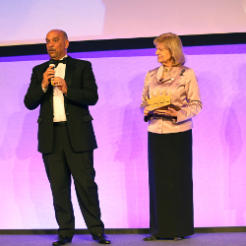The AMAR International Charitable Foundation picked up the award for international aid and development at last year’s Charity Awards, for its challenging work improving human rights in Iraqi prisons. Robert Cole reflects on the impact that winning the award has had.
Iraq is a difficult environment for any NGO, and having operated there for the last 23 years, AMAR teams know more than most about the challenges involved.
However, even for our organisation, the last eight months have been tough.
Not long after that heady night when we collected our Charity Award for the international aid and development category for 2014, the Islamic State invaded, killing and injuring thousands and forcing more than two million more from their homes to live as internally displaced people (IDPs) wherever they could.
Our normal project work has continued of course, but we have also been running a fundraising appeal to help carry out emergency work across this troubled nation. Once again our model of employing local staff to look after local people has worked brilliantly, and we are proud to say that many of the medical staff treating the IDPs come from within their own communities.
Helped with fundraising
Winning the Charity Awards has helped hugely in our fundraising efforts. As a small charity that worked for many years beneath the publicity radar, finding the hard cash to support our amazing teams in Iraq has been tough.
Now though, the publicity generated by the award has helped put us on the map, and simply having the prize-winning logo on our outgoing emails has made a huge difference. It has helped taken us to the next level and for that we will always be extremely grateful.
Ultimately it means that we are able to do more for the people that really matter, the hundreds of thousands of Iraqis we help to build and improve their lives.
We won our award specifically for our innovative and unique programme work inside five prisons in Iraq, teaching the prisoners, prison guards, and their families on the outside, about human rights and the rule of law.
Our analysis shows that 711 guards took part in the scheme, with 86 per cent of prisoners reporting a subsequent improvement in their behaviour. Some 1,882 inmates attended the voluntary sessions which exceeded the intended 1,400.
We targeted women and juveniles as they were seen as the most vulnerable to abuse. A further 550 prisoners participated in literacy and numeracy classes.
Now the Iraqi government has committed to the continued success of the project. The programme has been adopted by Ministry of Justice, and may become part of daily life for prisoners in many Iraqi jails.
At their request, prisons are continuing the literacy and numeracy classes and beginning vocational training. The Director of Curricula has announced that the human rights of all minorities will now be included in the Iraqi curriculum.
AMAR’s regional director, Dr Ali Muthanna, said his teams in Iraq had been “absolutely thrilled” to win the award. It was a vindication of all their hard work over the years, he said.
“In Iraq, AMAR has always been well thought of, but winning this award gave us tangible proof to show people just how well we were regarded. It made us all immensely proud and even more determined to help our fellow countrymen and women,” explained Dr Ali.
Launchpad for new projects
Alys Brown, who co-ordinated the project in London, said she had always hoped the award would help AMAR to expand its work and continue to help those most in need. This had proved to be the case and had provided a “launchpad” for a whole new set of innovative projects.
For example, in the next few months we will start a new programme to help teach community leaders, civil society organisations, teachers, children and students about religious diversity and freedom.
With the horrific recent events in Iraq likely to continue for the foreseeable future, AMAR’s work and expertise in the region will be needed more than ever.
However, as this award shows, AMAR is now recognised not just for its medical and educational programmes, but also for schemes such as the prisons’ project. Uniquely for the region, we also help women to fight gender-based violence and teach empowerment and skills through vocational training and initiatives.
So our work continues apace, but thanks to the Charity Awards, we move forward with the knowledge that we have been recognised not just in the Middle East but in this country for our outstanding work.
Robert Cole is head of communications at AMAR International Charitable Foundation, winner of the international aid and development category at The Charity Awards 2014.
- Entries are now open for The Charity Awards 2015, sponsored once again by Charities Aid Foundation. Click here to find out more.










